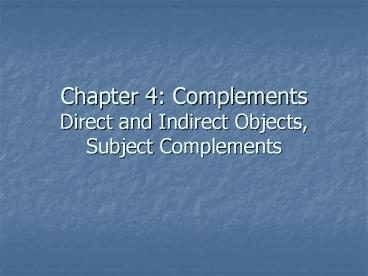Chapter 4: Complements Direct and Indirect Objects, Subject Complements - PowerPoint PPT Presentation
Title:
Chapter 4: Complements Direct and Indirect Objects, Subject Complements
Description:
There are two kinds of subject complements the predicate nominative and the predicate adjective. ... A predicate nominative is a word or word group that is in ... – PowerPoint PPT presentation
Number of Views:1626
Avg rating:3.0/5.0
Title: Chapter 4: Complements Direct and Indirect Objects, Subject Complements
1
Chapter 4 ComplementsDirect and Indirect
Objects, Subject Complements
2
A complement is a word or a word group that
completes the meaning of the verb.
- Every sentence has at least one subject and verb.
Often a verb also needs a complement to make the
sentence complete. - Marlene brought what?
- Marlene brought sandwiches.
- Carlos thanked whom?
- Carlos thanked her.
- We were what?
- We were hungry.
- As you can see, a complement may be a noun, a
pronoun, or an adjective.
3
- An adverb is never a complement.
- A complement is never part of a prepositional
phrase. - If you have trouble finding the complement, cross
out all the prepositional phrases. Then look for
the subject, verb, and complement in the rest of
the sentence.
4
Objects of Verbs
- Direct objects and indirect objects complete the
meaning of transitive verbs. - Remember, transitive verbs express actions
towards objects (nouns people, place, thing, or
idea).
5
Direct Objects
- A direct object is a noun, pronoun, or word group
that tells who or what receives the action of the
verb. - A direct object answers the question Whom? or
What? after a transitive verb. - Examples
- Our history class built a model of the Alamo.
- The noun model receives the action of the verb
built. - Has the freeze destroyed some of the crop?
- The pronoun some receives the action of the verb
has destroyed.
6
- A direct object can never complete the meaning of
a linking verb because a linking verb does not
express action. - William Wordsworth became poet laureate of
- England in 1843. The verb does not express
action. - A direct object is never part of a prepositional
phrase. - He walked for hours in the English countryside.
- A direct object may be compound.
- Mrs. Neiman planted tulips and daffodils.
7
Indirect Objects
- An indirect object is a noun, pronoun, or word
group that sometimes appears in sentences
containing a direct object.
8
An indirect object tells to whom or to what or
for whom or for what the action of the verb is
done.
- Examples
- Luke showed the class his collection.
- The noun class tells to whom Luke showed his
collection. - Sarita brought us a chess set.
- The pronoun us tells for whom Sarita brought a
chess set. - Dad gave whatever needed fixing his full
attention. - The noun clause whatever needed fixing tells to
what Dad gave his attention.
9
- Linking verbs do not have indirect objects.
- An indirect object, like a direct object, is
never in a prepositional phrase. A noun or
pronoun that follows to or for is the object of
the preposition, not an indirect object. - Like a direct object, an indirect object may be
compound.
Direct Object Indirect Object
Whom? To what?
What? To whom?
For what?
For whom?
10
Subject Complements
- A subject complement is a word or word group that
completes the meaning of a linking verb and that
identifies or describes the subject. - There are two kinds of subject complementsthe
predicate nominative and the predicate adjective.
11
Predicate Nominatives
- A predicate nominative is a word or word group
that is in the predicate and that identifies the
subject or refers to it. - Predicate nominatives are not in prepositional
phrases. - Predicate nominatives may be compound.
- Examples
- Mr. Richards became the mayor of a small town.
- Is the winner whoever gets the most votes?
12
Predicate Adjectives
- A predicate adjective is an adjective that is in
the predicate and describes the subject. - A predicate adjective completes the meaning of a
linking verb. - Predicate adjectives may be compound.
- Examples
- A nuclear reactor is very powerful.
- This chili tastes spicy.

